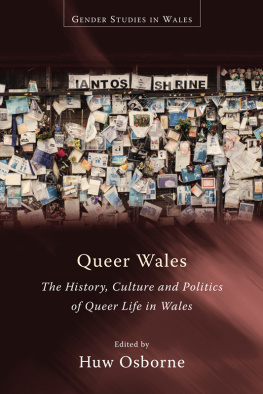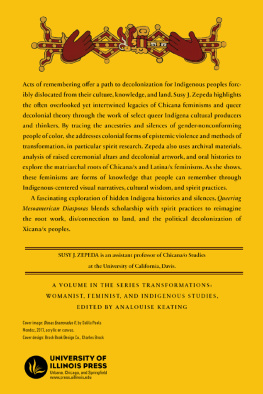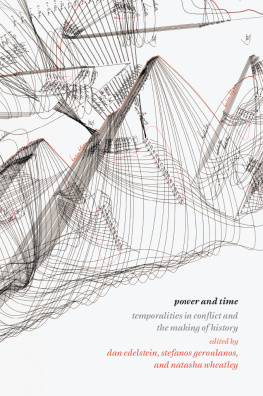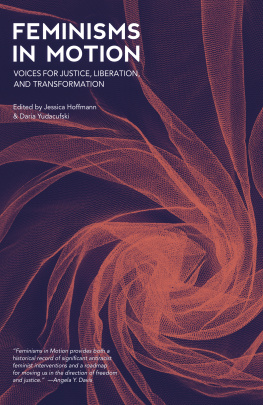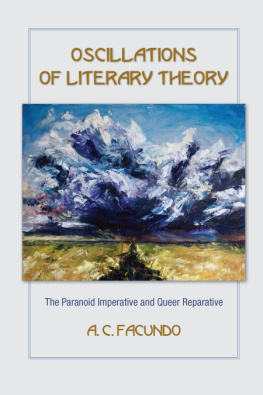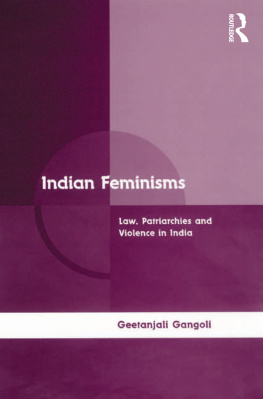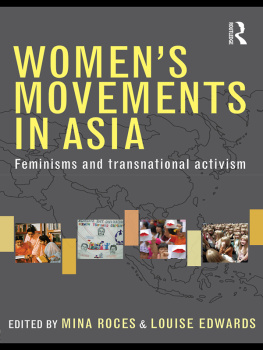Feminisms Queer Temporalities
Despite feminisms uneven movements, it has been predominantly understood through metaphors of generations or waves. Feminisms Queer Temporalities builds on critiques of the limitations of this linear model to explore alternative ways of imagining feminisms timing. It finds in feminisms literary and cultural archive narratives of temporality that might now be diagnosed as queer, where queer designates modes of being historical that exceed the linear and the generational.
Few theorists have looked to popular feminist figures, literature, and culture to theorize feminisms timing. Through methodologically creative readings, McBean explores non-generational, anti-linear, and asynchronous time in the figure of Antigone, Marge Piercys Woman on the Edge of Time, the film Ladies and Gentlemen, the Fabulous Stains, Valerie Solanas and SCUM Manifesto, and Alison Bechdels Fun Home.
The first to substantially bring together the ways in which time has come to matter in both feminist and queer disciplines, this book will appeal to students and scholars of feminist, queer and gender studies, cultural studies and literary studies.
Sam McBean is Lecturer in Modern and Contemporary American Literature at Queen Mary University of London. She has published on contemporary literature, new media, queer theory, and feminist theory in journals including Feminist Review, Camera Obscura, and the Journal of Lesbian Studies.
How does feminism reproduce itself? How can we think feminist history outside the limiting framework of generations and waves? Deeply engaged with recent work on the politics of time, Feminisms Queer Temporalities turns to an archive of feminist popular culture to imagine alternative futures for the field.
Dr Heather Love, University of Pennsylvania, USA
It is quite some time since I encountered new work in literary and cultural studies that feels as eye-opening and necessary as Feminisms Queer Temporalities. McBeans groundbreaking transmedial analysis ranging from womens lib classics to graphic novels and film demonstrates the ways in which queer temporalities have been central to the creation and operation of post-1960s feminist aesthetics. Rather than performing a rapprochement between feminist art and queer temporality, McBean charts an aesthetic landscape in which this distinction cannot be traced with ease, and in the process stages a crucial rethinking of the relations between these disciplines.
Dr Jane Elliott, Kings College London, UK
At the center of Feminisms Queer Temporalities is the deceptively simple but brilliant observation that feminism is a matter of timing. This is a book that lays to rest once and for all the misconception that feminist and queer theory are generational antagonists locked in a drama of disidentification and forgetting. Through richly original readings of her archive of popular feminist texts, McBean instead argues for the queerness of feminisms preoccupation with temporality. For McBean, belonging to feminism is a matter of being with its untimeliness.
Dr Victoria Hesford, Stony Brook University, USA
Feminisms Queer Temporalities cuts through misplaced assumptions that queer critical debates have somehow replaced or updated feminist ones and offers instead a more nuanced take on the recent history of this complex dynamic. A fresh and exciting new voice in these debates, Sam McBean shows how temporality can provide an illuminating conceptual focus for cultural analysis. Challenging the generational model of feminism and the methodology of contextualisation, McBean moves us through eloquent readings of the mythical figure of Antigone in feminist theory, the SCUM manifesto and Alison Bechdels graphic novel Fun Home. Breaking down the usual division of theories and texts, McBeans approach demonstrates just how interdisciplinary scholarship can reconfigure the temporal scales of both politics and culture. This book places feminism at the heart of the current attempt to rethink temporality across the humanities.
Professor Jackie Stacey, University of Manchester, UK
Transformations: Thinking Through Feminism
Edited by:
Maureen McNeil, Institute of Womens Studies, Lancaster University
Lynne Pearce, Department of English, Lancaster University
Other books in the series include:
Transformations: Thinking Through Feminism
Edited by Sarah Ahmed, Jane Kilby, Celia Lury, Maureen McNeil and Beverley Skeggs
Thinking Through the Skin
Edited by Sara Ahmed and Jackie Stacey
Strange Encounters: Embodied Others in Post-Coloniality
Sara Ahmed
Feminism and Autobiography: Texts, Theories, Methods
Edited by Tess Cosslett, Celia Lury and Penny Summerfield
Advertising and Consumer Citizenship: Gender, Images and Rights
Anne M. Cronin
Mothering the Self: Mothers, Daughters, Subjects
Stephanie Lawler
When Women Kill: Questions of Agency and Subjectivity
Belinda Morrissey
Class, Self, Culture
Beverley Skeggs
Haunted Nations: The Colonial Dimensions of Multiculturalisms
Sneja Gunew
The Rhetorics of Feminism: Readings in Contemporary Cultural Theory and the Popular Press
Lynne Pearce
Women and the Irish Diaspora
Breda Gray
Jacques Lacan and Feminist Epistemology
Kirsten Campbell
Judging the Image: Art, Value, Law
Alison Young
Sexing the Soldier
Rachel Woodward and Trish Winter
Violent Femmes: Women as Spies in Popular Culture
Rosie White
Pregnancy, Risk and Biopolitics: On the Threshold of the Living Subject
Lorna Weir
Feminist Cultural Studies of Science and Technology
Maureen McNeil
Arab, Muslim, Woman: Voice and Vision in Postcolonial Literature and Film
Lindsey Moore
Secrecy and Silence in the Research Process: Feminist Reflections
Risn Ryan-Flood and Rosalind Gill
Working with Affect in Feminist Readings: Disturbing Differences
Marianne Liljestrm and Susanna Paasonen
Feminism, Culture and Embodied Practice: The Rhetorics of Comparison
Carolyn Pedwell
Gender, Sexuality and Reproduction in Evolutionary Narratives
Venla Oikkonen
Feminisms Queer Temporalities
Sam McBean
Forthcoming:
Irish Feminist Futures
Claire Bracken
Sociability, Sexuality, Self: Relationality and Individualization
Sasha Roseneil




